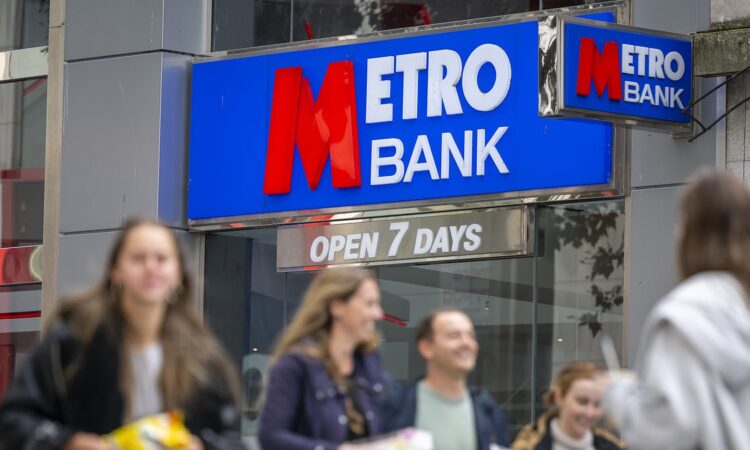
- Metro Bank says 1,000 job losses will be complete by mid-April 2024
- From 29 March, all 76 branches will no longer open on Sundays or bank holidays
Metro Bank has confirmed 1,000 staff will be axed by mid-April as part of the lender’s £80million cost-cutting drive.
The lender’s cost cutting drive followed a balance sheet crisis last year that saw Metro Bank finally secure fresh financing and a debt refinancing package, amid fears for its survival.
On Wednesday, Metro Bank said it was on track to deliver £50million of annualised cost savings in the first quarter of 2024, primarily due to the departure of the staff, which comprise 22 per cent of its workforce, by mid-April.
A further £30million of annualised cost savings is expected to be delivered by the end of 2024, the lender added.
Chief executive Daniel Frumkin cautioned that further cost cuts would ‘inevitably’ lead to more jobs going.
Metro Bank said the’ exits agreed’ resulted in £43million of annual savings.
A cost-cutting drive helped Metro Bank narrow its annual loss last year, new results showed on Wednesday.
The bank’s underlying pre-tax loss came in at £16.9million for 2023, against a loss of £50.6million in 2022.
The group saw cash outflows stabilise towards the end of the year after an eleventh-hour capital injection. Deposits grew by 1 per cent from June to £15.62billion by 31 December.
Related Articles
HOW THIS IS MONEY CAN HELP
The lender confirmed it had also reduced branch opening hours this year.
From 29 March, all 76 branches will no longer open on Sundays or bank holidays and opening hours will be cut following a review launched last autumn.
The group said that the bulk of its branches, 44 sites, will only be open five days a week, from Monday to Friday, 9.30am to 5pm.
The remaining 32 stores will be open six days a week, from 9.30am to 5pm on Monday to Friday, and 11am to 4pm on Saturdays.
Frumkin said: ‘During the year we also launched a cost saving plan which included reducing store hours and roles across the organisation.
‘These efforts will ensure the bank is right-sized for the future, with a strong focus on both digital and great customer service.’
The lender added: ‘Whilst we have reduced our store opening hours in 2024, we remain committed to maintaining a physical presence and ensuring that stores remain both accessible and at the heart of local communities.’
Metro Bank said it was working to identify sites for new branches in the north of England.
The group said locations being prioritised were aimed at its support Metro Bank’s SME, commercial and corporate banking operations.
It said: ‘Further store openings in the north of England will predominantly focus on out-of-town locations with parking which are easier for businesses to access and can serve larger populations.’
However, it added that further changes could be on the way to its store portfolio and operations.
Metro Bank said: ‘We will continue to explore options to further right-size our cost base in the months ahead, as we look to secure a sustainably profitable future for the bank. Part of this will include continuing to review our options around stores and our real estate which remain one of the largest components of our fixed cost base.’
The lender added that while its branches remained its ‘core offering’, it would continue working to digitising its operations.
It said: ‘A particular area of focus will continue to be on enhancing our self-service features as well as building out our SME offering where we feel we are continuing to win market share in an area which remains underserved by the market.’
In November, Metro Bank received shareholder approval for a £925million refinancing and recapitalisation plan, backed by Colombian billionaire, Jaime Gilinski, who became the firm’s biggest investor.
In October, reports claimed the bank needed to raise about £600million. As a result, the group’s share price fell by around a third to an all time low of 34p.
Anthony Thomson, the bank’s former chairman from 2010 to 2012, claimed the lender had a ‘limited future’ if it continued to focus on its branch network. He said the lender was pursuing a ‘flawed strategy.’
Metro Bank shares rose 5.81 per cent or 2.00p to 32.40p on Wednesday, having fallen over 70 per cent in the last year.
Some links in this article may be affiliate links. If you click on them we may earn a small commission. That helps us fund This Is Money, and keep it free to use. We do not write articles to promote products. We do not allow any commercial relationship to affect our editorial independence.





